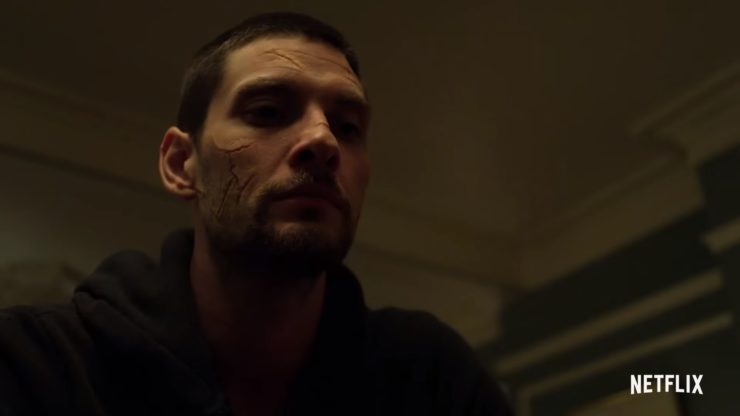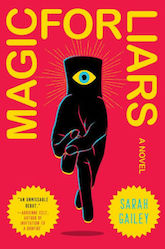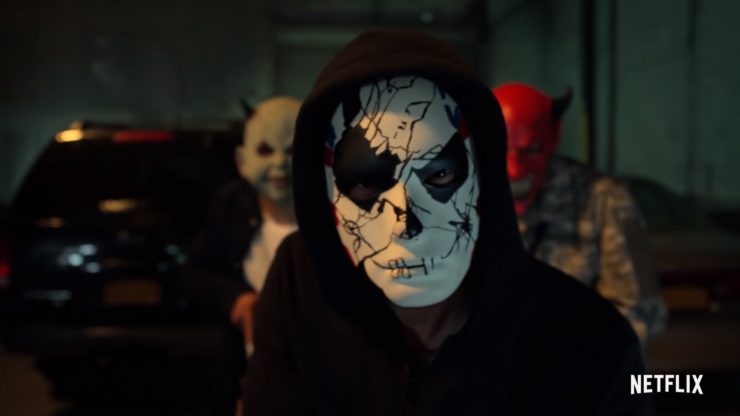If Netflix releases a Marvel series and it has no buzz whatsoever, did they actually release it?
After taking the world by storm with a superb first season of Daredevil, followed by Jessica Jones and Luke Cage doing likewise, Marvel’s street-level Netflix series seemed poised to do for TV what the Marvel Cinematic Universe had done for movies.
But Netflix seems to want out of the Marvel business. They cancelled Iron Fist, which surprised no one given the lukewarm reception to same, but then they cancelled two of their bona fide hits, Luke Cage (whose first season was so popular it briefly broke Netflix) and Daredevil (the thing that started it all). Worse, none of the shows’ second seasons created the same buzz and anticipation of their first, and the crossover series was flawed.
The unplanned part of the whole thing, The Punisher, taking advantage of Jon Bernthal’s breakout performance in Daredevil season two, just released its second season, and it may be Marvel’s swan song, pending whether Jessica Jones season three happens or not.
If so, it ended with quite a whimper.
SPOILERS for The Punisher season 2 and the rest of the Netflix MCU

The sophomore outing for The Punisher could charitably be called a mess. There are two concurrent plots going on that not only have nothing to do with each other, they also actively interfere with each other.
We start with Frank Castle—now “Pete Castiglione,” the new ID created for him by the Department of Homeland Security after season one—in Michigan, watching a band at a bar and chatting with the bartender, Beth. A jerk hits on Beth and Castle manages to drive him off, and the two eventually fall into bed together. The entire relationship between Castle and Alexa Davalos’s Beth is charming as heck (aided by Jagger Nelson’s cheerfully snotty-kid performance as her son Rex).
However, this isn’t a rom-com with Pete and Beth, it’s The Punisher, so naturally, Castle gets embroiled in some shit when a young woman is attacked by a large number of trained professional soldiers. Turns out the young woman—who we eventually learn is named Amy—is part of a crew of criminals who took pictures of a U.S. senator, David Schultz, kissing a man. They were hired by Russian mobsters who want to have dirt on a presidential candidate. (Wow, that’s not timely at all…)
Said senator is the child of two very rich Evangelical Christians (played with appropriate skeeviness by Corbin Bernsen and Annette O’Toole) who want him to be president and must keep his homosexuality a secret. To that end, they have one of their flock—a semi-reformed neo-Nazi named John Pilgrim—and the aforementioned mercenaries retrieve the pictures and kill the ones responsible. Pilgrim kills the mobster who hired the criminals, and also the criminals—except for Amy, who got away because she was out getting food and then hid under the bed when Pilgrim came back. And she has the pictures.
Castle saves her, but Pilgrim keeps coming. Beth gets shot, and eventually Castle and Amy wind up in a sheriff’s office having a showdown with Pilgrim’s seemingly endless supply of mercenaries—
—and then Agent Madani shows up to take him back to New York because Billy Russo has escaped the hospital and needs to be found.
The Russo plot is an even bigger mess. For starters, Russo’s face is supposed to be hideously scarred by Castle slamming his face into a mirror over and over again at the end of last season, but he’s got a couple three facial cuts, and that’s it. He’s one mediocre plastic surgeon away from looking no different. Hell, in the final few episodes, Castle looks worse after getting beat up, and nobody’s talking about him like he’s hideously scarred. One episode started with a flashback to Russo and Castle’s time serving together in the Marines, and I honestly couldn’t tell the difference in Ben Barnes’s face. The makeup department utterly failed the script here, as people keep saying that Russo looks horrible and acting like he’s all ugly and horrid-looking, but he mostly looks like Ben Barnes being dishy.
Russo is enabled by his therapist, Dr. Krista Dumont (Floriana Lima trying her best). She has a troubled past that is nowhere near enough to explain how and why she suddenly falls in love with Russo and is willing to throw her entire career away and be an accessory to murder in order to give him closure and run away with him. Russo, meanwhile, gathers some ex-vets to form a gang—which he then inexplicably abandons, along with his obsessive vendetta against Castle, in order to run away with Dumont. Neither side gives us enough to believe that they’d throw everything away for each other.
Also Russo apparently has amnesia—but not complete amnesia, as he seems to remember some things, but most important is that he has no recollection of Castle’s family being massacred, nor his role in it, nor anything that happened in season one. It’s set up to give us some kind of payoff when he does remember or is confronted with what he’s done, but we never see that or get that. We just get this weird-ass romance with Dumont.
The two stories are supposed to be intermingled, but—just as Castle’s introduction in Daredevil season two resulted in a schizophrenic season that didn’t gel—they mostly just interfere with each other. Castle goes back to New York and takes Amy with him because—well, honestly, I have no clue why Castle keeps Amy around, nor why Amy sticks around especially when she gets so many opportunities to bugger off. She only runs away late in the season when there’s a bounty on her and Castle’s heads, so she needs to be rescued, but why didn’t she leave sooner?
Amy is left twiddling her thumbs for several episodes while Castle goes off to deal with Russo—and Russo is also left on his own because Castle is dealing with Pilgrim, and it’s all just a big mess of people sitting around doing nothing waiting because their part of the plot isn’t on stage just then.
Worse, the plot with the Schultzes and Amy has to be crowbarred into New York City because that’s where the show films and where Castle is from, and where Russo is. But it would work much better staying in Michigan, and actually playing out on its own for half the season, and then have Castle brought back to New York by Madani after the Schultz story was finished, with Castle having completely gone all Punisher again.
And then in the end, it all just sort of collapses in on itself. The Schultzes are the theoretical bad guys of the Amy half of the plot, but Castle doesn’t even know who they are until the final episode, and their big confrontation consists of a FaceTime call at the top of the thirteenth episode and a more direct confrontation at the very end. Russo’s story ends with him seeing Madani and Dumont getting into a fight that ends with the latter falling out a window (repeating a childhood trauma where her father attempted a murder-suicide with her by grabbing her and jumping out a window, and only succeeded at the suicide part, but she was badly injured). Russo then confronts Madani, but she shoots him three times. He gets away, but winds up getting shot dead by Castle who walks in on him bleeding on the floor, shoots him twice, and walks away. Okay, then.
The characterizations are all over the place. Russo’s amnesia is a mess, his level of obsession and anguish is wildly inconsistent. Amy is either a great con artist or a terrible con artist depending on the needs of the plot that week. Pilgrim creates no impression whatsoever, as he plays him with such a bland affect that it’s hard to care about him. Mind you, the script wants us to care about him because he has a dying wife and two sons, but he’s mostly just a force-of-nature villain, which are, bluntly, the most boring villains in fiction.
And once again, the show refuses to even acknowledge that it’s part of the Marvel Cinematic Universe, the sole exceptions being the presence of Deborah Ann Woll’s Karen Page in one episode, Rob Morgan’s Turk Barrett in another episode, and Royce Wilson’s Detective Brett Mahoney as a recurring character. But even there, it’s problematic, as the events of Daredevil season 3 should have informed the characterizations of Page and especially Mahoney. At this point in the MCU timeline, Hell’s Kitchen, Harlem, and Chinatown each has its own neighborhood hero (and you can throw Forest Hills in there too, thanks to a certain spidery character played by Tom Holland), and that’s the sort of thing that should maybe come up in conversation when this particular vigilante comes back to town. For that matter, Mahoney’s very recent experiences both with Bullseye pretending to be Daredevil and especially with Wilson Fisk’s gaggle of corrupt federal agents should affect his dealings with, respectively, Castle and Madani. (And this has to take place after DD season 3, as Page is back to working for Nelson & Murdock, which is how she gets in to see Castle in the hospital, as she works for his lawyer of record, as established back in DD season 2.)
Buy the Book


Magic for Liars
As for Page’s guest appearance, it feels like it’s there just because Bernthal and Woll established such a good relationship in DD season 2 that they want to re-create it, but there’s so much water under the bridge for both characters since then that it feels awkward. (I also love Castle’s speech to Page that she can’t come with them, that pretty much boils down to, “Sorry, Karen, but you’re only contracted for one episode, so you have to leave now.” Danny Rand’s one-episode guest shot in Luke Cage season 2 had similar issues.)
The season has its moments. There are some superb set pieces here, from the standoff at the sheriff’s office, which is gloriously filmed, written, and acted; to Russo’s bank robbery, which is almost done in by a magnificently stubborn bank manager played with terrific Noo Yawk attitude by Cecilia Antoinette; to the delightfully klutzy fight among an injured Pilgrim, the crippled Curtis, and the barely competent Amy in the trailer. There are a lot of really strong supporting characters here, and they’re all people of color, too: Jason R. Moore’s Curtis, who remains the only grownup in Castle’s life; Mahoney; Joe Holt’s excellent Sheriff Hardin who refuses to let vigilante thugs take his prisoner; Brandon Gill’s Deputy Ogden, who gets himself shot and still acts like a hero to save the life of Amy, who stole five bucks from him; Antoinette’s Lillian; and Amber Rose Revah’s Agent Madani, whose recovery from the trauma of season one is not smooth.
But as ever, the season manages to be watchable primarily on the strength of Bernthal, who has the uncanny ability to have chemistry with anyone he’s standing next to. He modulates so perfectly from the almost-content Castle of the opening into angry rage as the season goes on, but what’s fascinating here is that he’s the most together person in the cast, mostly because he’s the only one who’s completely comfortable with who he is and what he’s doing. He has a purity of purpose that no one else can manage. It’s a superb performance, as always, and it’s only a pity it’s wasted in this mess of a season.
Netflix and Marvel had a good thing going, and it’s really too bad that corporate nonsense is spoiling it—though junk like this and the two seasons of Iron Fist don’t exactly inspire confidence in their ability to continue with skill, either. Having said that, the fact that we’re not getting more of Daredevil or Luke Cage (jury’s still out on Jessica Jones) is a travesty.
Keith R.A. DeCandido has also reviewed Iron Fist, The Defenders, Luke Cage season 2, and the first season of The Punisher for this site. His “4-Color to 35-Millimeter: The Great Superhero Movie Rewatch” appears here every Friday, an in-depth look at every live-action superhero movie based on a comic book (including a look at the three attempts to do a Punisher movie). His 2019 releases include the novels Mermaid Precinct (latest in his fantasy police procedural series), A Furnace Sealed (first in a new urban fantasy series), and Alien: Isolation (based on the movie series and the videogame), and stories in the anthologies Thrilling Adventure Yarns, Unearthed, and Release the Virgins!










